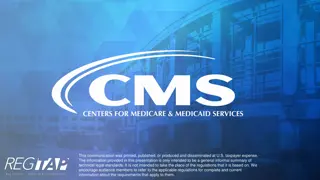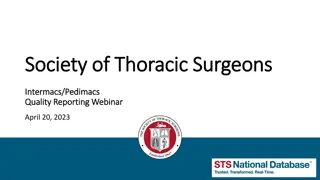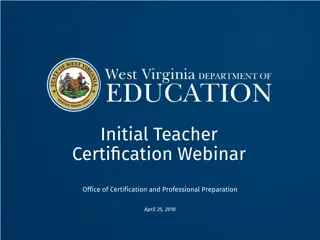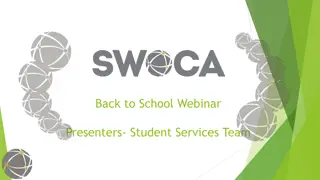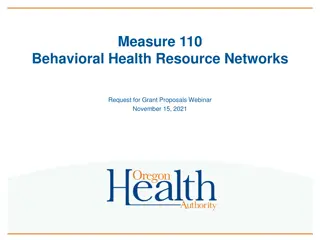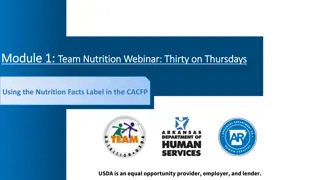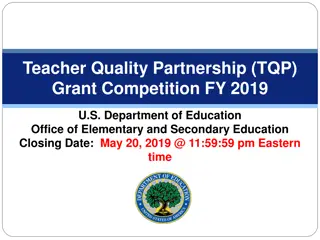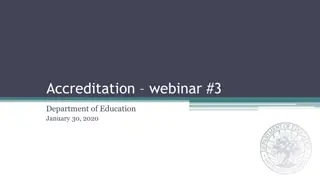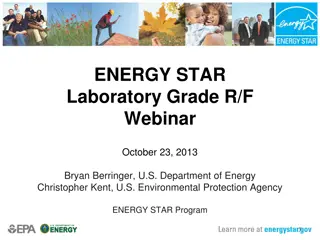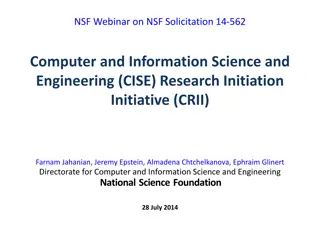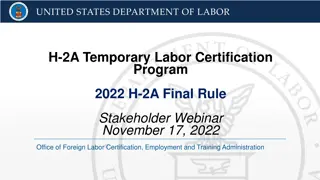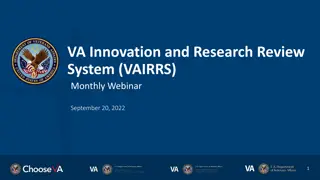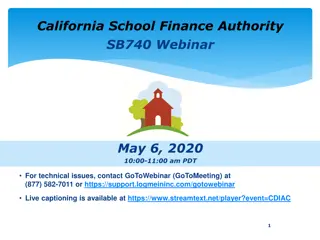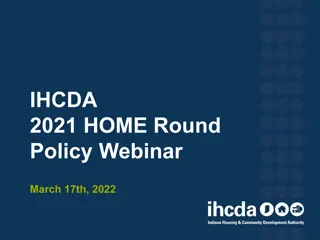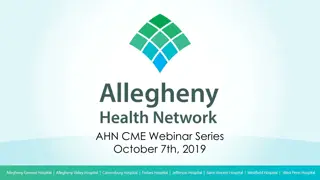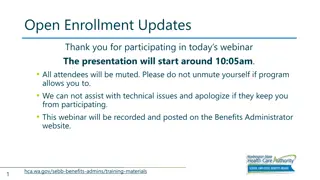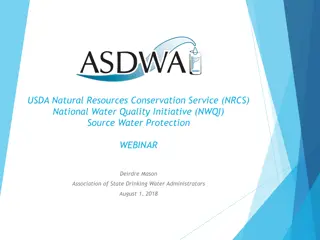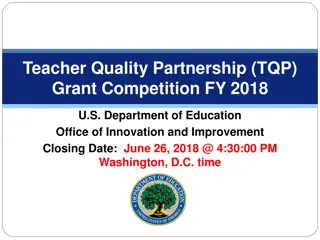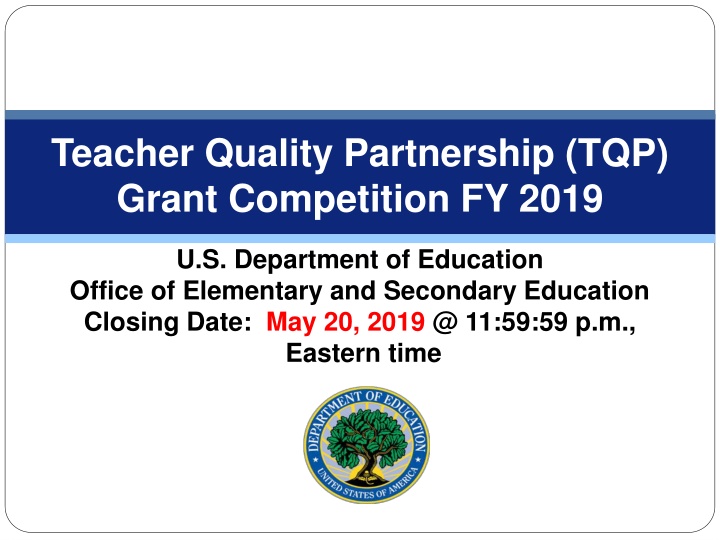
Teacher Quality Partnership (TQP) Grant Competition - FY 2019 Overview
Get all the details you need for the Teacher Quality Partnership (TQP) Grant Competition FY 2019 from the U.S. Department of Education. Find out about eligibility requirements, program priorities, selection criteria, budget considerations, and more.
Download Presentation

Please find below an Image/Link to download the presentation.
The content on the website is provided AS IS for your information and personal use only. It may not be sold, licensed, or shared on other websites without obtaining consent from the author. If you encounter any issues during the download, it is possible that the publisher has removed the file from their server.
You are allowed to download the files provided on this website for personal or commercial use, subject to the condition that they are used lawfully. All files are the property of their respective owners.
The content on the website is provided AS IS for your information and personal use only. It may not be sold, licensed, or shared on other websites without obtaining consent from the author.
E N D
Presentation Transcript
Teacher Quality Partnership (TQP) Grant Competition FY 2019 U.S. Department of Education Office of Elementary and Secondary Education Closing Date: May 20, 2019 @ 11:59:59 p.m., Eastern time
Note About These Slides The slides presented on this webinar will be available for download on the TQP webpage. Applicants are strongly encouraged to download the TQP TQP Application Instructions Package from the TQP webpage and review it in its entirety. The TQP Application Instructions Package provides instructions needed to apply for this TQP grant. http://innovation.ed.gov/what-we-do/teacher-quality/teacher-quality-partnership/ Note: These slides are intended as guidance only and do not impose any requirements beyond those included in the language of 20 U.S.C. 1021 1022h, the NIA, and any other applicable provisions established in rules for this competition. Please refer to the official documents published in the Federal Register. 2
General TQP Competition Q&A Applicants are strongly encouraged to read the TQP Notice Inviting Applications in its entirety. Applicants are strongly encouraged to read the TQP Frequently Asked Questions (FAQs) document in its entirety. If your questions are not answered in the TQP FAQs document, you may email them to the TQP program inbox at TQPartnership@ed.gov. Please do not wait until the last minute to email your questions. 3
Agenda for This Webinar I. TQP Program Purpose and Overview II. Eligibility Requirements III.TQP Program Requirements IV. FY 19 Program Priorities V. Selection Criteria & Scoring VI. Competition Reminders and Resources VII. Budget and Matching Requirements 4
Budget and Match Topics TQP Program Costs 2% Administrative Cost Cap What does this mean for your grant and your budget? 100% Non-Federal Match Requirement Submission of Budget and Budget Narrative Optional Budget Narrative Template
All Costs Must be Allocable Costs incurred must be specifically for the operation of the TQP award and not for the IHE or LEA as whole. ASK: Can the line item costs be directly linked to specific activities that support the TQP grant objectives? Ex: Is the applicant paying the full salary of a staff person, even though that person will only commit 20% FTE to the project?
All Costs Must Be Allowable All costs must be allowed by the TQP program statute and OMB circulars. Note: If the applicant is an IHE, use OMB Circular A-21, and if it s a non-profit, use OMB Circular A- 122. Ex: Living wage stipends for residency candidates are allowable; however paying tuition for project participants is NOT allowable. 8
All Costs Must Be Reasonable All costs must be comparable to market prices or established rates for similar types of work. Examples: Travel for 2-3 staff to attend an annual project directors meeting in Washington D.C. is reasonable; travel for 10 staff to attend an annual conference is not reasonable. Paying $5,000 for a laptop computer or hiring a staff secretary for $85,000 are not reasonable. 9
All Costs Must be Necessary ASK: Are the costs needed for the project to succeed? Or, are costs excessive, nice to have and/or appear to be added just because funds are available? Ex: TQP Project orders $2,000 worth of tote bags as a marketing tool to promote the TQP project. While these may be nice to have, they are not necessary to meet the objectives of the project. 10
Budget Item Cautions! Some of the major reasons why TQP budgets are flagged for reductions. Budget Item Why your budget may be cut Tuition and Student Stipends Tuition payments and tuition reduction for project participants are not allowable under the TQP program. The only allowable project participant stipend is the Living Wage Stipend. Excessive or Unexplained Technology Purchases Grant funds should not be used to provide technology for each project participant. Also, there should be a justification for all technology purchases that links back to the goals and objectives of the grant. Excessive or Unexplained Travel Costs Travel for board members and larger numbers of project staff is is not allowable. Travel costs for project participants is not allowable. All travel must be justified and link back to the goals and objectives of the grant Licensing or Examination Fees TQP programs may train participants on how to pass state teaching test, but may not pay the fees associated with taking the actual test. Excessive Honorariums and Food Costs Food is actually not an allowable cost under the TQP program. However, we do allow minimal amounts of for food to cover working lunches. Grant funds should not be used to host entire conferences and/or pay for conference speakers. Budgets that Exceed $1.5 M per Year The NIA states that TQP awards should not exceed $1.5M per year. If your annual budget request exceeds $1.5M, it will be reduced.
Indirect Cost Rate (ICR) Agreements TQP is a restricted rate program so your ICR should not exceed 8 percent. LEAs and some non-profit organizations may have a rate lower than 8 percent and must use the lower rate. If you do not have a federal ICR agreement, you may claim 8 percent ICR until you get an official agreement. For more questions on ICR please email: IndirectCostGroup@ed.gov.
What is the 2% Administrative Cap? Per HEA section 203(d), an eligible partnership that receives a grant may use not more than two percent of the funds provided to administer the grant.
How is the 2% Calculated? The 2% cap is calculated from the total amount of Federal Funds awarded. The 2% cap is also calculated from the total amount of Matching Funds secured. Overall TQP Grant $4 million/year $2 million/year Federal funds $40,000 is the TQP federal funds admin cap (2%) $2 million/year matching funds $40,000 is the TQP matching support admin cap (2%) $80,000 total to use for administrative costs for your TQP grant.
What are Administrative Costs? Administrative costs encompass grant expenses associated with administering the grant. These costs can be both personnel and non- personnel, and both direct and indirect. Therefore, the limitation applies to the combined claims for indirect costs and direct administration costs. Generally, direct administrative costs differ from indirect charges in that the latter are considered organization-wide costs.
Ex. of Direct Administrative Costs Examples of direct administrative costs are salaries, benefits, and other expenses of the recipient's staff that perform the following functions: Overall program management, program coordination, and office management functions including the salaries and related costs of the executive director, project director and/or project evaluator; Preparing program plans, budgets schedules, and related amendments; Monitoring of programs, projects, sub-recipients and related systems and processes; Developing systems and procedures, including management information systems, for assuring compliance with program requirements; Preparing reports and other documents related to the program requirements; Evaluating program results against stated objectives; and Divisional level administrative services such as program specific accounting, auditing or legal activities.
Ex. of Non-labor Costs Examples of non-labor costs for direct administration include: Costs for goods and services required for administration of the program, including the rental or purchase of equipment, utilities, office supplies, postage, and rental and maintenance of office space; and Travel costs incurred for official business in carrying out program management. Costs are NOT considered administrative if they are considered facility costs under an approved indirect cost rate agreement (see 2 CFR 200.414).
Do you have a visual to help explain this? Indirect Administrative Costs and Direct Administrative Costs are both subject to the 2% overall TQP program cap on Administrative Costs Indirect Facilities Cost (subject to your entity s ICR) Direct Program Costs (only limited by amount of Federal award) (see 2 CFR 200.413) Indirect Administrative Costs (subject to 2% admin cap) Direct Administrative Costs (subject to 2% admin cap) (see 2 CFR 200.414) Indirect Facilities Costs and Indirect Administrative Costs are still subject to your entity s approved indirect cost rate (ICR) agreement. The TQP program uses the training indirect cost rate of eight percent per 34 CFR 75.562.
Practical Example Modified Total Direct Costs (MTDC) is $1,000,000 $20,000 is the 2% cap on Administrative Costs Grantee will use $10,000 in indirect administrative costs Grantee will use $10,000 in direct administrative costs Grantee will have $910,000 available for direct program costs Grantee will use $70,000 in indirect facilities costs If using the training rate per 34 CFR 75.562, $80,000 is the cap on the amount that can be reserved for indirect costs.
PREPARING YOUR BUDGET AND BUDGET NARRATIVE
TQP Budgets Applicants will prepare budget summary request for all five years using the ED 524 Budget form. Applicants will use the ED 524 form for federal costs and non-federal match. Applicants must also submit a budget narrative for all five years that explains federal costs and non-federal match. Applicants are strongly encouraged to use the optional budget narrative template found on the TQP website. Revised budgets will be submitted annually as part of the annual performance report.
Purpose of the Budget Narrative Present and justify all expenses required to achieve the TQP project goals and objectives. Be realistic: request only what is necessary and reasonable, and provide an adequate justification of all expenses. Keep in mind that Year 1 is often a planning year and may not require as large of a budget as Years 2-5. Spend funds according to your annual budget to avoid large sums of carryover or unused funds which could be returned to Treasury.
TQP Budget Narrative Template We are providing an optional budget narrative template on the TQP website. We strongly encourage applicants to use this template when preparing their budget narratives for submission in Grants.gov. Applicants may add or delete lines within the template to fit their needs, however we encourage applicants to maintain the general structure and essence of the budget narrative template.
TQP NON-FEDERAL MATCH REQUIREMENT
TQP 100% Non-Federal Match Requirement Section 203(c) of the HEA, requires that each grantee provide matching funds equal to 100% of the total amount of the TQP grant award. Matching funds must be from non-Federal sources. Matching funds may be provided in cash or as in-kind donations. Applicants may not use unrecovered Indirect Costs towards meeting the match requirement. If a cost is unallowable with Federal funds it is also unallowable with matching funds. The TQP Program follows the Supplement Not Supplant Rule from section 202(k) of the HEA. 27
Purpose of the Matching Requirement The purpose of the match is two-fold: 1) to share the Federal government s cost for programs with State and local agencies and the private sector; and 2) to promote the sustainability of programs past the life of the Federal financial award. Consider the Federal funds as seed money. It s important to list your donors and specify the value of their contributions to your grant.
Match: Cash or In-Kind Cash Match, i.e., a cash contribution, can come from applicant s own funds (general revenue), cash donations from non-Federal third parties (i.e., partner organizations), or from non-Federal grants. In-Kind Match is a non-cash contribution of value provided by the applicant or by non-Federal third parties. In-kind match is typically the calculated value of personnel, goods, and services, including direct and indirect costs.
Documenting the Match We have provided the following optional resources on TQP Website: Chart to Track Donors and Matching Fund Amounts Sample Letters of Match Commitment http://innovation.ed.gov/what-we-do/teacher- quality/teacher-quality-partnership
Waiver of the Non-Federal Match Given the importance of matching funds to the long-term success of the project, eligible entities must identify appropriate matching funds in the proposed budget. The Secretary does not anticipate waiving the match requirement. 31
NOTE: Adequacy of Resources The selection criteria include factors such as the adequacy of support, including facilities, equipment, supplies, and other resources, from the applicant organization or the lead applicant organization and the relevance and demonstrated commitment of each partner in the proposed project to the implementation and success of the project, which may include a consideration of demonstrated matching support. 32
Budget and Match Questions If you have questions about TQP budget or matching requirements, please review the TQP FAQs document first on the TQP webpage. If your question is not answered in the FAQs document, you may email your question to TQPartnership@ed.gov. 33
TQP Competition Reminders Closing Date: May 20, 2019 at 11:59:59 p.m., Eastern time. Late applications WILL NOT be reviewed. FY 19 Intent to Apply Due Date: May 1, 2019 Send Intents to: TQPartnership@ed.gov All applications must be submitted electronically using Grants.gov. REGISTER NOW! Grants.gov Help Desk: 1-800-519-4726. 34
Thank you for your interest in the TQP Grant Program. Best wishes on a successful TQP application submission. Closing Date: May 20, 2019 @ 11:59:59 p.m., Eastern time



